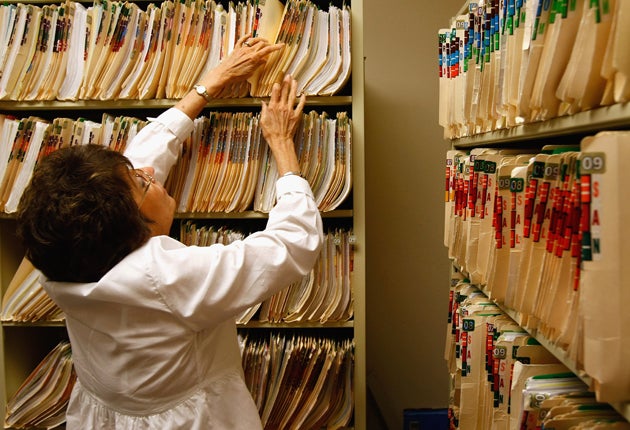Coalition reneges on pledge to scrap central NHS database
Privacy campaigners accuse Cameron and Clegg of 'disgraceful U-turn' over manifesto promise

Your support helps us to tell the story
From reproductive rights to climate change to Big Tech, The Independent is on the ground when the story is developing. Whether it's investigating the financials of Elon Musk's pro-Trump PAC or producing our latest documentary, 'The A Word', which shines a light on the American women fighting for reproductive rights, we know how important it is to parse out the facts from the messaging.
At such a critical moment in US history, we need reporters on the ground. Your donation allows us to keep sending journalists to speak to both sides of the story.
The Independent is trusted by Americans across the entire political spectrum. And unlike many other quality news outlets, we choose not to lock Americans out of our reporting and analysis with paywalls. We believe quality journalism should be available to everyone, paid for by those who can afford it.
Your support makes all the difference.David Cameron and Nick Clegg were last night accused of a "disgraceful U-turn" over a key pledge to scrap a central database of patients' medical records.
To the anger of civil liberties campaigners, ministers have announced that the coalition will push ahead with the controversial Summary Care Record (SCR) database introduced by the Labour government, despite fears that it will expose private medical data to insurance firms and intrude on patients' privacy.
Both Conservative and Liberal Democrat election manifestos promised to scale back on "Labour's database state", while the parties' health spokesmen pledged before the poll that the centralising of NHS medical records would be halted.
Privacy campaigners are concerned that many patients do not realise that their medical information is being uploaded to a central database which can be accessed by GPs, nurses and hospital staff anywhere in the country. Patients must actively opt out of the scheme, which started to be rolled out across England in April.
There are some clear benefits to the database – for example, A&E departments could instantly access the records of a person injured in a car accident miles from home. But there are fears that the information could be misused or lost on a scale similar to the loss of the UK's entire child benefit data three years ago.
In a parliamentary written answer slipped out last week, the health minister Simon Burns said: "Uploading of information to the Summary Care Record will continue to take place, where the relevant general practitioner practices and primary care trusts (PCTs) agree that patients have been adequately informed about the process, and properly enabled to opt out should they wish, and where GP practices and PCTs are satisfied that data are of an appropriate quality for sharing."
The Conservative manifesto pledged to "scale back Labour's database state and protect the privacy of the public's information". It added: "The database state is a poor substitute for the human judgment essential to the delivery of public services."
Last year, the then shadow health minister Stephen O'Brien said a Conservative government would dismantle the NHS IT system.
And in March this year Norman Lamb, then Lib Dem health spokesman, said: "The Government needs to end its obsession with massive central databases. The NHS IT scheme has been a disastrous waste of money and should be abandoned."
Alex Deane, director of Big Brother Watch, said his organisation, together with Privacy International and NoID, the anti-identity cards campaign, had been demanding a meeting with the Conservatives over the health database but had been "stonewalled".
He said: "This is a disgraceful U-turn. The coalition wants us to believe that they are serious about privacy and civil liberties – this is their first test, and they have failed it.
"The SCR is an unnecessary and intrusive piece of bureaucracy, as well as being wildly expensive. Doctors have managed without it until now."
Mr Deane also pointed out that instead of being announced on the floor of the House of Commons, where it could be debated, the move was slipped out in a written answer on Thursday. He added: "New government, old tricks. No change, and no shame."
A Department of Health spokesman said: "We are working with primary care trusts and the British Medical Association to ensure that sufficient public and professional awareness has been raised about the records and how people can opt out."
In a separate move by the coalition, NHS staff could soon have a legal duty to inform patients every time there is an error in their care.
Patient safety campaigners will meet with the Department of Health next week to start work on how such a corporate duty would be monitored and what consequence NHS trusts would face if they failed to inform patients or relatives about mistake.
Half a million patient safety incidents are reported every year, though the true figure could me much higher. Campaigners believe such honesty would improve patient safety.
The move, which was part of the Lib Dems' health manifesto, "will require hospitals to be open about mistakes and always tell patients if something has gone wrong".
It could also apply to community settings and should be monitored by the Care Quality Commission, according to the charity Action against Medical Accidents (AvMA), which has campaigned for this change for years. The duty could be introduced without primary legislation.
Join our commenting forum
Join thought-provoking conversations, follow other Independent readers and see their replies
0Comments